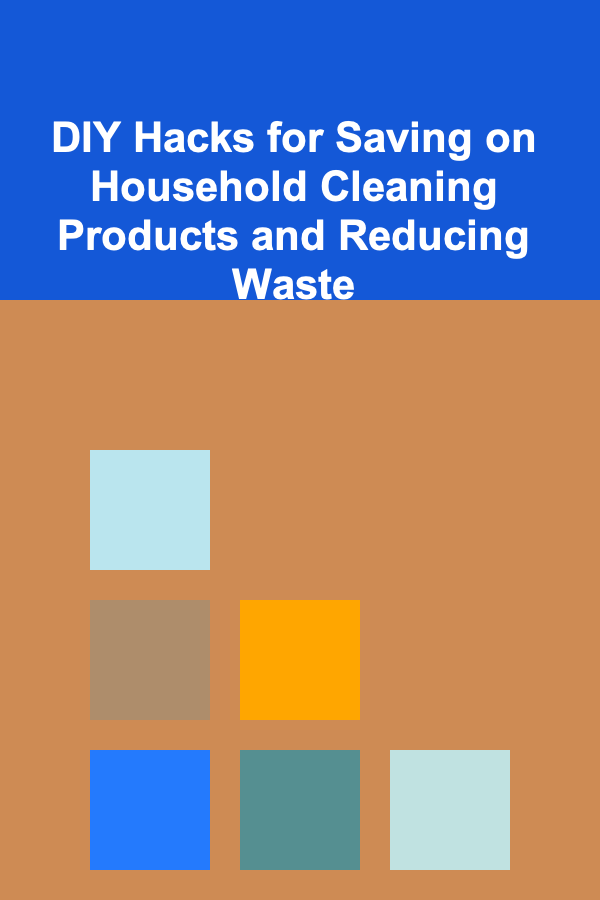
DIY Hacks for Saving on Household Cleaning Products and Reducing Waste
ebook include PDF & Audio bundle (Micro Guide)
$12.99$6.99
Limited Time Offer! Order within the next:

Household cleaning products are essential for maintaining a clean and healthy home, but they can also be a significant ongoing expense. The good news is that with a few simple DIY hacks, you can save money while reducing your environmental impact. By using natural ingredients, repurposing items you already have, and adopting waste-reducing practices, you can create effective, eco-friendly cleaning solutions that are budget-friendly and sustainable.
In this guide, we'll walk you through practical steps to make your own cleaning products, cut down on single-use packaging, and reduce waste in your cleaning routine.
The Power of Natural Ingredients
One of the easiest ways to save money on household cleaning products is by using natural ingredients that are already readily available in your kitchen or pantry. Common items like vinegar, baking soda, lemon, and essential oils are versatile, non-toxic, and effective in cleaning various areas of your home.
Vinegar: The All-Purpose Cleaner
White vinegar is a natural disinfectant and degreaser, making it perfect for a variety of cleaning tasks. It's effective in removing stains, odors, soap scum, and grime.
- General Cleaner: Mix equal parts water and white vinegar in a spray bottle. Use it to clean countertops, glass, and even bathroom surfaces.
- Deodorizer: Place a bowl of vinegar in a room to neutralize odors. It can be particularly useful in the fridge, trash can, or bathroom.
- Glass Cleaner: Combine 1 cup of water, 1 cup of vinegar, and 1 tablespoon of cornstarch in a spray bottle. Shake it well before use and spray it onto windows for a streak-free shine.
Baking Soda: The Scrubbing Powerhouse
Baking soda is a natural abrasive and deodorizer, perfect for tackling tough stains and grime. It also absorbs odors and can be used in a variety of cleaning scenarios.
- Scrubbing Paste: Make a paste by mixing baking soda and water. Use it to clean tubs, sinks, and kitchen counters. It's particularly effective for scrubbing grease and soap scum.
- Deodorizer: Sprinkle baking soda on carpets, upholstery, or in your shoes, let it sit for a while, and then vacuum it up to remove odors.
- Toilet Bowl Cleaner: Pour a cup of baking soda into the toilet bowl and scrub with a toilet brush. Let it sit for a few minutes before flushing to remove stains.
Lemon: The Natural Bleach and Deodorizer
Lemon is an excellent natural bleach and disinfectant. Its acidity helps break down dirt and stains, and its fresh scent can eliminate odors.
- Stain Remover: Mix lemon juice with baking soda to create a paste for removing stains on fabric or countertops. It works particularly well on coffee or tea stains.
- Microwave Cleaner: Fill a microwave-safe bowl with water and a few slices of lemon. Microwave on high for 3-5 minutes, then wipe down the interior with a cloth to remove grease and odors.
Essential Oils: For a Fresh, Natural Scent
Essential oils not only provide a pleasant scent but also have antimicrobial properties that make them useful in homemade cleaning solutions. Some of the most popular oils for cleaning include lavender, tea tree, eucalyptus, and lemon.
- Homemade Air Freshener: Add 10-15 drops of your favorite essential oil to a spray bottle filled with water. Spray around the house for a fresh scent without the chemicals in commercial air fresheners.
- All-Purpose Cleaner: Add a few drops of essential oil (like tea tree or lavender) to your vinegar-based all-purpose cleaner for extra antibacterial power and a pleasant fragrance.
DIY Cleaning Products Recipes
Creating your own cleaning products is not only cost-effective but also allows you to control the ingredients, reducing your exposure to harmful chemicals. Below are some simple recipes to make your own cleaning solutions.
All-Purpose Cleaner
This simple recipe works on countertops, tables, and other hard surfaces.
- 1 cup of white vinegar
- 1 cup of water
- 1 tablespoon of baking soda
- 10 drops of essential oil (optional)
Instructions:
- Combine the vinegar and water in a spray bottle.
- Add the baking soda and shake gently to dissolve.
- Add essential oils for scent and antibacterial properties, if desired.
- Spray on surfaces and wipe clean with a cloth or sponge.
Glass Cleaner
For sparkling windows and mirrors without streaks, this is a great DIY solution.
- 1 cup of water
- 1 cup of white vinegar
- 1 tablespoon of cornstarch
Instructions:
- Combine all ingredients in a spray bottle and shake well before use.
- Spray onto glass surfaces and wipe with a microfiber cloth or paper towel for a streak-free shine.
All-Natural Floor Cleaner
This solution works for most types of hard floors, including tile, wood, and laminate.
- 1 gallon of warm water
- 1/4 cup of white vinegar
- 10-15 drops of essential oil (such as tea tree or lemon)
Instructions:
- Mix all ingredients in a mop bucket.
- Use a mop to clean the floor, ensuring it's damp (not soaking wet) to avoid damaging wood floors.
Toilet Cleaner
A natural alternative to commercial toilet bowl cleaners.
- 1/2 cup of baking soda
- 1/2 cup of white vinegar
- 10 drops of essential oil (optional)
Instructions:
- Sprinkle the baking soda into the toilet bowl.
- Pour in the vinegar and let it sit for about 10 minutes.
- Scrub with a toilet brush and flush.
Reduce Waste with Smart Practices
Aside from making your own cleaning products, there are several other ways you can reduce waste in your cleaning routine.
Use Reusable Cloths Instead of Paper Towels
Paper towels are convenient, but they contribute significantly to waste. Switch to reusable microfiber cloths or old t-shirts cut into rags to wipe down surfaces. These cloths are washable and can be reused multiple times, reducing both waste and cost.
Repurpose Containers for Your DIY Cleaners
Instead of buying new spray bottles or cleaning containers, reuse the ones you already have. Many commercial cleaning products come in sturdy plastic containers that can be cleaned and repurposed for your DIY solutions. This reduces plastic waste and saves money.
Buy in Bulk and Refill
When possible, buy cleaning ingredients like vinegar, baking soda, and essential oils in bulk. This reduces the amount of single-use plastic packaging and can be more cost-effective in the long run. You can refill your spray bottles or containers as needed, reducing the need for frequent repurchases.
Avoid Single-Use Products
Many cleaning products, such as disposable dusters or single-use mop pads, generate a lot of waste. Invest in reusable alternatives like washable mop heads, microfiber dusters, and cloths. Not only are these options better for the environment, but they also save you money over time.
Composting for Cleaning Waste
Items like citrus peels or used coffee grounds can be composted rather than thrown away. When using lemon or oranges for cleaning, save the peels to add to your compost bin. This way, nothing goes to waste, and you're contributing to a more sustainable household.
The Benefits of DIY Cleaning Solutions
Choosing to make your own cleaning products and adopt waste-reducing practices offers several key benefits:
- Cost Savings: Homemade cleaning products are often much cheaper than store-bought alternatives. Simple ingredients like vinegar, baking soda, and essential oils go a long way, and you can buy them in bulk to save even more.
- Healthier Home Environment: Many commercial cleaning products contain harsh chemicals that can trigger allergies, irritate skin, or cause long-term health issues. DIY solutions are non-toxic, making them safer for your family and pets.
- Environmental Impact: Reducing waste from single-use plastic packaging, reusing containers, and using natural ingredients contributes to a healthier planet.
- Customization: When you make your own products, you can tailor them to your preferences. Whether you prefer a specific scent or want to avoid certain chemicals, DIY cleaners offer full control over the ingredients.
Conclusion
Switching to DIY cleaning solutions and adopting waste-reducing practices is a simple and effective way to save money while contributing to a healthier and more sustainable environment. By using natural ingredients like vinegar, baking soda, and essential oils, you can create powerful cleaning products without breaking the bank. Additionally, reducing single-use items and reusing containers helps minimize waste and reduces your environmental impact.
With these DIY hacks, you don't have to sacrifice cleanliness for sustainability. You can have a sparkling, fresh home while saving money and being more eco-conscious. The next time you reach for a store-bought cleaning product, consider the natural alternatives you can make right at home.
Reading More From Our Other Websites
- [Scrapbooking Tip 101] Digital Meets Analog: Hybrid Scrapbooking Projects for the Modern Adult
- [Home Party Planning 101] How to Plan a Kid's Birthday Party That Parents Will Enjoy Too
- [Home Holiday Decoration 101] How to Design a Stunning Holiday Wreath for Your Door
- [Home Space Saving 101] How to Efficiently Use Vertical Space for a More Organized Home
- [Organization Tip 101] How to Track Your Net Worth as Part of Your Budget
- [Organization Tip 101] How to Create a Minimalist Home Office Setup
- [Personal Care Tips 101] How to Shave Your Face for the First Time with a Razor
- [Home Maintenance 101] How to Maintain Your Home's HVAC System for Optimal Efficiency
- [Personal Investment 101] How to Build a Passive Income Stream Using Deep Learning Models
- [Home Pet Care 101] How to Decode Your Pet's Anxiety: Understanding the Root Cause and Finding the Right Remedy

How to Build a Checklist for Monitoring Email Campaign Performance
Read More
How to Make Money Online as an Electrician: 10 Actionable Ideas
Read More
How to Stage a Home to Sell During the Winter Season
Read More
How To Train Your Dog for Advanced Obedience
Read More
How to Print Functional Parts with 3D Printing
Read More
How to Incorporate Budgeting into Your DIY Home Project To-Do List
Read MoreOther Products

How to Build a Checklist for Monitoring Email Campaign Performance
Read More
How to Make Money Online as an Electrician: 10 Actionable Ideas
Read More
How to Stage a Home to Sell During the Winter Season
Read More
How To Train Your Dog for Advanced Obedience
Read More
How to Print Functional Parts with 3D Printing
Read More